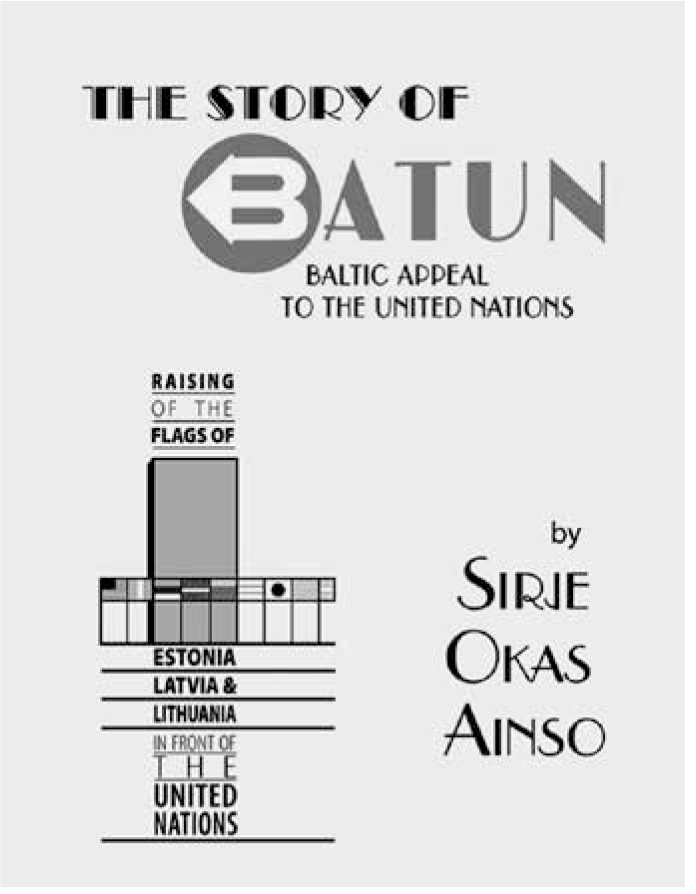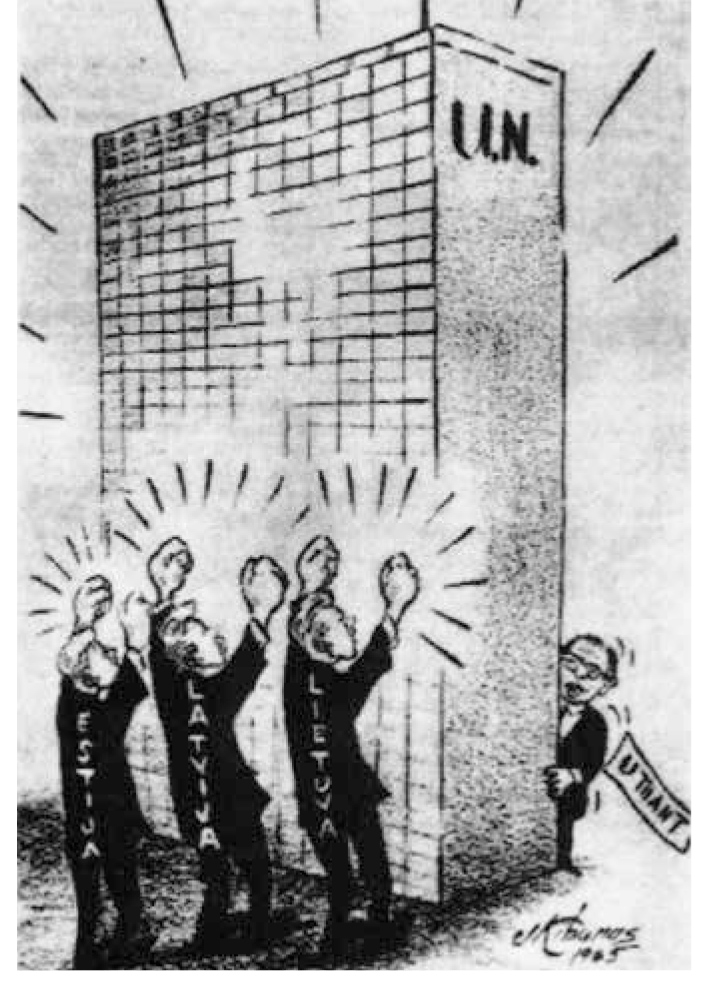
Copyright © 2019 LITUANUS Foundation, Inc.
Editor of this issue: Almantas Samalavičius
 LITHUANIAN
QUARTERLY JOURNAL OF ARTS AND SCIENCES
|
ISSN
0024-5089
Copyright © 2019 LITUANUS Foundation, Inc. |
|
Volume
65, No.1 - Spring 2019
Editor of this issue: Almantas Samalavičius |
Book Review
 |
The Story of BATUN (Baltic Appeal to the United Nations) by Sirje Okas Ainso. In large format, 108 pages, plus extensive appendices of photographs and documents, 2018 USA, ISBN 978-0-692-10308-1 |
In 1965, an ad hoc group of young Lithuanians organized a massive rally, about 14,000 people, at Madison Square Garden in New York City, to mark the 25th anniversary of Soviet occupation of the Baltic states, Lithuania, Latvia and Estonia, and to bring the question of Baltic independence before the United Nations.
Out of this rally, a permanent organization, “Baltic Appeal to the United Nations” (BATUN), was established the following year with a board of directors and officers from exiles of each of the three Baltic nations. BATUN’S purpose and its mission, was to inform and lobby the UN to take up and address “The Baltic Question”.
Ms. Ainso, an active Estonian member of BATUN for many years, documents the 25 years, lasting until the Baltics regained their independence, during which BATUN’s staff, mostly unpaid volunteers, wandered in the wilderness, receiving no official response and little encouragement from the UN. No country wanted to confront the USSR, even if some individual UN diplomats were sympathetic (revolutionary Iran’s diplomat advised BATUN representatives to “die for your cause”).
 |
In 1970, several events brought worldwide attention to the Soviet repressive regime in the Baltic States, including Pranas Brazinskas and his 13 year old son hijacking a Soviet plane and forcing it to land in Turkey, and Simas Kudirka jumping from a Soviet vessel on to the deck of a US Coast Guard cutter and then being forcibly returned to the Soviets. These events encouraged and provided additional impetus for BATUN’s work.
Much of BATUN’s initial focus was on the UN’s declaration of 1960 on decolonization, and on UN support for independence for colonized countries. The Baltic countries were being colonized by the Russians, who at that time called themselves Soviets. But many UN member countries had no interest in supporting Baltic self-determination, since it may have set a precedent for minorities within their own countries to seek independence. BATUN then shifted its emphasis and focus from “self-determination” for the Baltics, to “violations of human rights” by the Soviets. (BATUN was aware that one of the basic “human rights” being violated, of course, was “self-determination” or, simply put, independence. So, this was not a change of mission, but simply promoting the same mission in a different package.)
BATUN continued over the years to visit and lobby individual UN diplomats, providing them with memorandums and position papers on the status of the Baltic states. This gained the Baltic states’ claim to independence increasing numbers of favorable responses from individual UN diplomats. But official action by the UN was not forthcoming.
It was not until 1991, when events in the Baltics themselves were outpacing international political maneuvering, that “The Baltic Question” finally found a place on the official UN agenda – almost simultaneously with the declarations of independence by Lithuania, Latvia and Estonia.
It was at this time that BATUN’s many years of efforts at the UN also provided additional benefits. Not only had BATUN staffers, over the years, kept the UN informed of the issues relating to the Baltic States. BATUN staff had also accumulated knowledge of how the UN and its various bureaucracies worked, and gained a favorable reputation with a number of UN delegations.
BATUN was, thus, able to lend its knowledge and familiarity with the UN and some of its individual delegates, to the inexperienced Baltic diplomats, which made entry and integration into the UN, smoother than it would otherwise have been. A number of BATUN activists also entered the diplomatic service of the three emerging nations.
BATUN had been formed at the initiative of Lithuanian activists, and from BATUN’s first president, rev. Jonas Balkűnas, through the last Lithuanian activists such as Gintë Damuđis and others, Lithuanians continued to work in BATUN, but over the years BATUN’s most active members were Latvians and Estonians.
Perhaps the most significant accomplishment of BATUN is its contribution to keeping the three Baltic states’ quest for independence alive and not forgotten. When the USS R started to fall apart, it was not necessary to start from zero, not necessary to explain to the world’s nations that there existed these countries called Lithuania, Latvia and Estonia, and not necessary to explain why their people were demanding independence.
BATUN, through its information and lobbying efforts, had kept the world and its diplomats and politicians informed, and had thus prepared the ground for Lithuania’s, Latvia’s and Estonia’s entry into the community of nations.
The Baltic states, in declaring independence and in seeking to join the UN, received support from a number of nations, and especially early support from the Scandinavians. Then, on August 28, 1991, France and the United Kingdom, presented to the UN Secretary General letters from Lithuania, Latvia and Estonia, seeking admission to the UN, which was granted on September 17, 1991.
There is not much literature about BATUN. Ms. Ainso’s book is a chronological documentary, with much detail, dates, names, photographs and documents, of the actions of the largely volunteer staffers of BATUN, who worked for years, responded to changing world events, and did not waiver in pursuit of their mission. T he book will be a valuable resource for future historians and researchers.